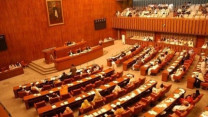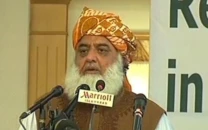The HEC and its devolution
Eighteenth Amendment Implementation Commission recommended HEC to have certain powers.

The Eighteenth Amendment Implementation Commission, constituted under Article 270 of the Constitution of Pakistan, recommended that the HEC, as a federal level body, should have certain powers. These include the commission authority to evaluate the performance of institutions, prescribe conditions for higher and technical education, set up national or regional evaluation councils, accreditation, evaluation and ranking of institutions.
As far as the legislation on higher education at the provincial level is concerned, the Sindh Provincial Assembly passed the Provincial Higher Education Commission (PHEC) Act during the last days of previous government which was challenged by the Sindh High Court on the grounds that the proposed law was in conflict with the constitution. On the other hand, the new Khyber-Pakhtunkhwa government established a working group to deliberate the issue and present recommendations. The provincial government of Balochistan is reviewing the matter along the same lines. There is no clarity so far.
As per its manifesto, the ruling PML-N government supports a strong, autonomous and resourceful HEC at the federal level. One of the major developments that took place in the higher education sector after the passage of the Eighteenth Amendment is transfer of the powers for the appointment of vice chancellors and other administrative matters from the governor (representative of the federal government) to the chief minister – the elected chief executive of the province. This is a consequential development because it vests greater power to an elected representative, while allowing the provincial authorities a greater leeway in overseeing the education sector.
However, last month, a committee meeting in Punjab, called to deliberate on a higher education commission for Punjab, expressed reservations over several powers vested to the province and called to keep the federal body intact.
According to officials in the HEC, K-P is the only province which is developing its provincial education body with consent of the federal commission. Besides, the new HEC chief, Dr Mukhtar Ahmed recently commented in an interview published in this newspaper that he was not against the devolution of federal body, but this step should not be taken in a hurry. The next few months will be crucial not only for provinces but also for HEC, which will report to the government about devolution of higher education body and its status on federal level.
Published in The Express Tribune, May 1st, 2014.



















COMMENTS
Comments are moderated and generally will be posted if they are on-topic and not abusive.
For more information, please see our Comments FAQ